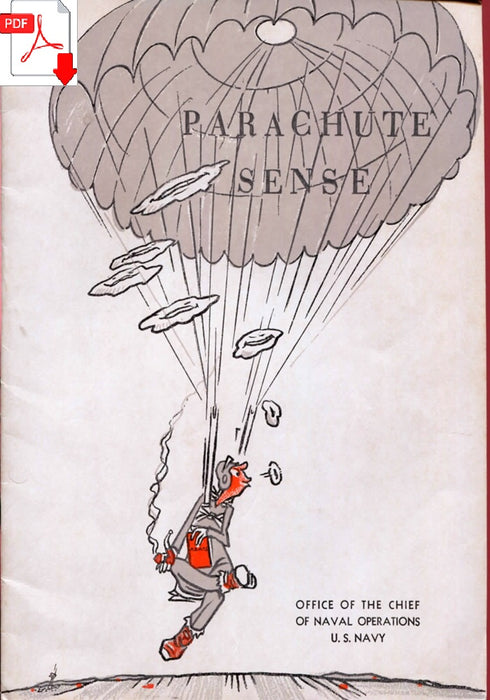
US Navy - Parachute Sense (ebook)
Parachute sense
ISSUED BY AVIATION TRAINING DIVISION OFFICE OF THE CHIEF OF NAVAL OPERATIONS - U. S. NAVY
You're on your way to being an accomplished flyer. More than that—an ac-complished combat flyer. You know what that entails—airmanship, seamanship, gunnery, navigation, radio, and more than a casual knowledge of your power plant.
It also entails something else—the responsibility on your part to remain alive to use the education given you in these branches of war aviation. You represent a lot of investment—you're a valuable property. So be a good fellow and don't knock yourself off.
The Navy decided to shoot another hundred and twenty-five dollars and provide you with a parachute. During your career as a Naval Aviator you will spend a great deal of time sitting on, among other things, your parachute. Do not allow the monotony of this to lull you into the false impression that a parachute is a cushion. If that were the purpose of it, the Navy could have provided you with a simple Kapok pillow that would have been less expensive and more comfortable. A parachute is much more than a cushion. It is a handy device for saving your life.
A parachute consists of a large nylon umbrella, or bumbershoot, together with certain straps and buckles for attaching it to your person. The umbrella part will take care of its end with no help from you; the straps and buckles must be adjusted.
Properly adjusted! Otherwise you may undergo the embarrassing experience of having a parachute bring you down quite safely, but in several pieces. This is due to the fact that when a parachute opens, it kicks like an Army mule. The opening of a carelessly adjusted parachute will often knock a man out. Correctly adjusted, the same parachute will waft you to earth safely, gently, and intact.
In the first place, those buckles are meant to be buckled. Otherwise you may reach the earth well ahead of your parachute, which is not considered par for the course. All straps should be properly positioned, and snug. This does not mean that you are expected to risk gangrene by cutting off your circulation entirely; it simply means that loose straps, particularly loose leg straps, can snap a bone like a twig when the 'chute opens.
So if your parachute is on—and adjusted—let us hurry on to the importance of (a) being aware of the necessity of getting out of your plane the instant you real¬ize you can't bring it in safely, (b) knowing how to get out, and (c) knowing what to do after you get out.
28 pages - in english - PDF to download





